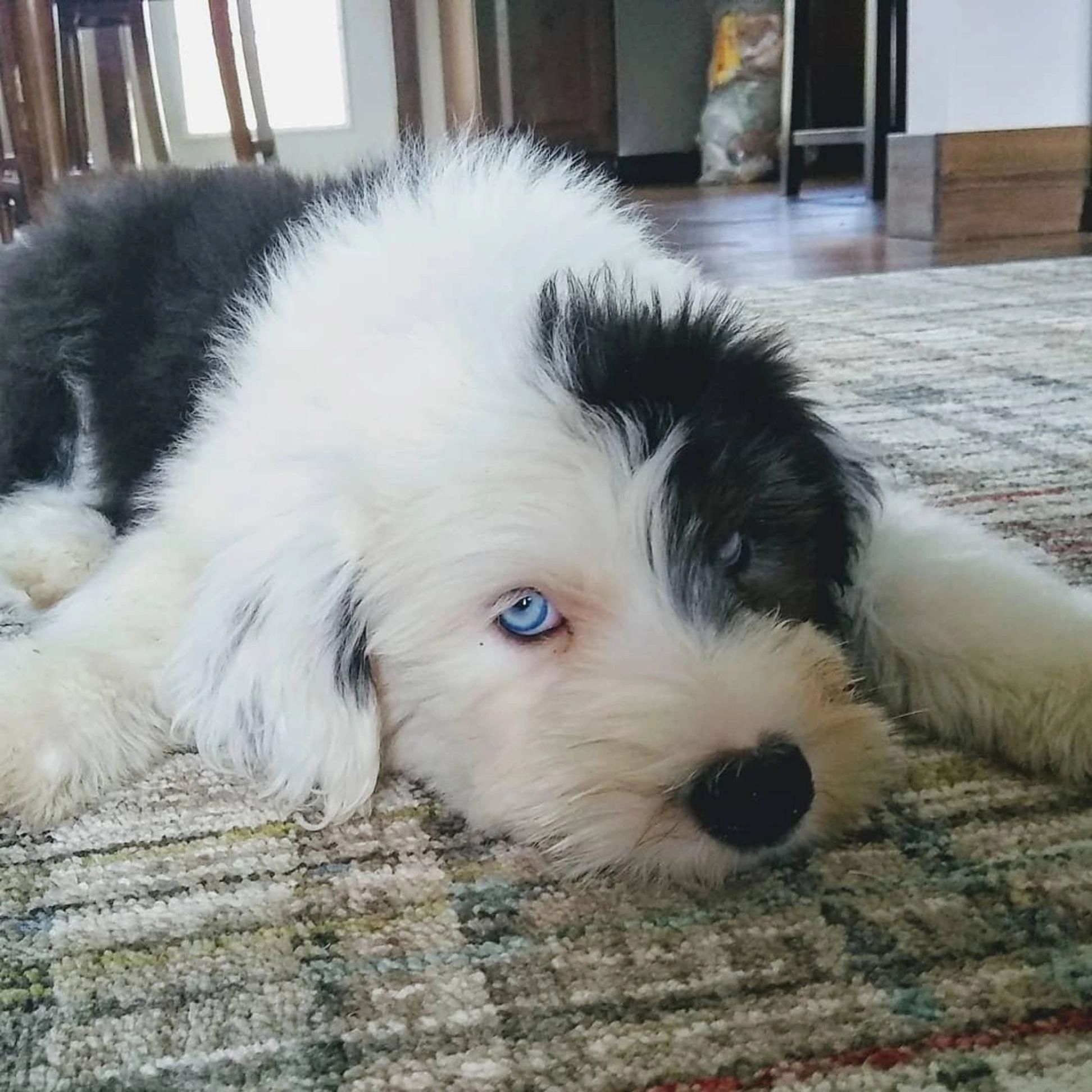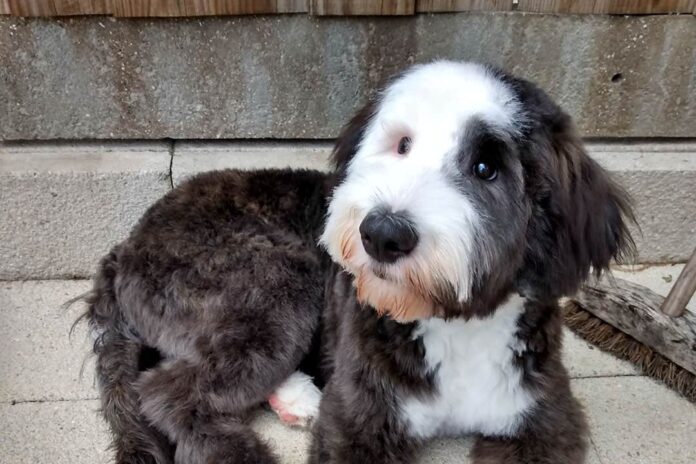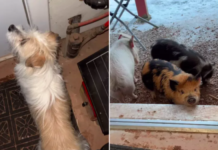Last Updated on August 10, 2022 by Fumipets
The Sheepadoodle is a crossbreed with a near-perfect temperament, combining the calm, gentle disposition of an Old English Sheepdog with the intellect and excellent trainability of a Poodle.
How much does a Sheepadoodle cost?
The majority of Sheepadoodles will cost you between $1,000 and $3,000. The most popular colours, black and black with white, are typically the cheapest, while uncommon colours, such as red and white or chocolate, are usually the most expensive.
Bringing a new puppy home is a joyful and unforgettable event, but there are many steps to do beforehand, from locating a breeder and comparing costs to preparing to welcome your new arrival home. We’ll go over all of this and more in the next sections.

Actual Breeder Prices
We understand that knowing how much a Sheepadoodle puppy will cost is crucial for many individuals. We’ve gotten genuine pricing from real Sheepadoodle breeders to give you a realistic sense of what to anticipate when you start your puppy hunt.
| Breeder | Location | Price |
| Best Sheepadoodles | South Carolina | $1,000 – $3,000 |
| Poodles2Doodles | Iowa | $3,500 and up |
| Sheepadoodles By Design | Arkansas | $2,500 |
| California Sheepadoodles | California | $2,500 and up |
| Deb’s Doodles | Virginia | $2,500 – $3,500 |
What About Mini Sheepadoodles?
Sheepdoodles in smaller sizes aren’t as frequent as the normal breed, although certain breeders do have them on occasion. They are produced by crossing a female Old English Sheepdog with a male Miniature Poodle. They weigh between 24 and 45 pounds and stand less than 20 inches tall at the withers.
Mini Sheepadoodles are usually priced at least $50 more than standard Sheepadoodles by breeders that do sell them.
What To Look For When Selecting A Breeder
If you want a healthy, well-behaved puppy, you must choose a reputable breeder. To prevent supporting puppy mills, stay away from pet shops and internet mass-sale sites.
Rather, seek for a breeder who:
- Encourages you to come to her house and see the parents dogs and pups.
- Has health screens performed on dogs prior to breeding to reduce the occurrence of diseases known to affect the breeds.
- Has already begun the socialisation process.
- Can offer a puppy health certificate from a veterinarian.
- Inquires about your home life, job schedule, and dog experience to guarantee that you’ll be able to provide a stable, loving home for the puppy.
- Takes the time to answer your questions and educate you on how to care for your dog.

Preparing for Your New Puppy
So you’ve located the perfect breeder, chosen your favourite puppy from the litter, and paid the deposit to keep him until he’s old enough to leave his first family. Now, what’s next?
Now is the time to start getting ready! Here’s what you should do while you’re waiting for the big day.
Do Your Homework
Immerse yourself in the Sheepadoodle universe. Sheepadoodle Facebook groups may be found here. Join Reddit’s communities. If at all feasible, contact someone who really has a Sheepadoodle. You get the idea.
Most breeders will not only address your concerns on pick-up day but will also urge you to contact them if any issues occur in the future, so make a list of any questions you have.
Raising A Puppy
With a puppy, you’ll be dealing with a disrupted sleep pattern, potty training, teething, and the testing of boundaries, as well as a lot of questions and perhaps some self-doubt.
You’ll have a lot less free time after your new baby comes, so take advantage of the time you have now to educate yourself.

Puppy Training
Knowing simple instructions and regularly obeying them may one day save your dog’s life, and a well-trained, well-mannered dog is a pleasure to live with. Training is one area of dog ownership where you cannot afford to be slack.
Sheepadoodles are such happy-go-lucky dogs that any kind of severe training may harm their emotional well-being and ruin your connection. The only way to proceed is to use positive reinforcement and reward-based training techniques.
Consult your veterinarian.
Before your puppy arrives, the ideal time to select a veterinarian is now. Make a few phone calls to find out which ones take new customers, what their office hours are, and what their emergency procedure is.
When you’ve found the one you like, schedule an appointment to set up your client file and ask any questions you have about the clinic or puppy care in general. While you’re there, schedule your puppy’s first visit.
Your veterinarian will give you the following information:
- Schedules for vaccinations in your area.
- Puppies’ nutritional requirements and feeding regimens.
- Guidelines for physical activity
- Safety recommendations such as when your puppy can meet other dogs or go out in public.
- Pet insurance information
Purchase Supplies
As you’ll soon discover, puppies require a good bit of paraphernalia. Not only will you need an adjustable collar, a leash, and ceramic or stainless steel bowls for food and water, but you’ll also need a grooming kit with nail clippers and training rewards.
A wide range of toys, such as balls, soft toys, tug-of-war ropes, and, of course, chew toys, will be appreciated by your puppy.
You should also have some pet stain remover and paper towels available in case of mishaps.
Most experts suggest utilizing a crate to help with housebreaking and provide a safe environment for your dog. Potty training is hastened in a crate because it replicates a dog’s natural denning urge, and few dogs would voluntarily dirty “their” personal area.
When you leave the home, knowing that your puppy is secure and your possessions are safe from those needle-sharp puppy teeth will offer you peace of mind. A soft bed inside the crate will encourage your dog to relax until you return.

Create a separate area for your dog.
For a little puppy, leaving his original family and home may be a difficult event. You’ll want to have everything ready for him before he comes to ensure a smooth transition.
Set up your dog’s kennel in a calm area of your house. A location where he may see everyday events from a distance while being connected to his family is perfect. Make it as comfy and cosy as possible for him to feel that this is his unique, secure spot, a respite from the rest of the world.

Create New House Rules
Before your puppy arrives, it’s a good idea to establish a few new home rules and make sure that everyone in the family is on the same page when it comes to puppy regulations. You may want to consider the following new rules:
- If you don’t want it chewed, put it away.
- Always ensure that any doors leading to the outdoors are securely sealed.
- No feeding from the table.
- Everyone uses the same cue words for training.
- Leave the puppy alone when he’s in his crate.
- No teasing, yelling at, or hitting the dog, ever.
It’s also a good idea to make a feeding, exercise, grooming, and toilet trip routine now. This schedule should be established and agreed upon by everyone so they are accountable for a fair part of the labour and may connect with the new puppy.


















